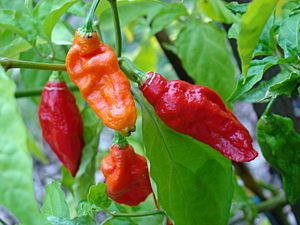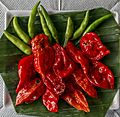Ghost pepper facts for kids
Quick facts for kids Ghost pepper |
|
|---|---|
 |
|
| Hybrid parentage | Capsicum chinense × Capsicum frutescens |
| Origin | Assam, Nagaland and Manipur in Northeast India |
| Heat | |
| Scoville scale | 1,041,427 SHU |
The ghost pepper, also known as bhut jolokia, is a super-hot chili pepper. It grows naturally in Northeast India. This pepper is famous for its extreme spiciness.
Contents
How Hot Is the Ghost Pepper?
In 2007, Guinness World Records named the ghost pepper the hottest chili in the world. It had a heat rating of over one million Scoville Heat Units (SHUs). The Scoville scale measures how spicy a pepper is. For comparison, a regular jalapeño pepper is usually only a few thousand SHUs.
However, other peppers have since become even hotter. By 2011, three new chilies had passed the ghost pepper in heat. Then, in 2013, the Carolina Reaper became the world's hottest pepper. It still holds that record today.
What Is the Scoville Scale?
The Scoville scale was created by an American pharmacist named Wilbur Scoville in 1912. It measures the amount of capsaicin in a pepper. Capsaicin is the chemical compound that makes peppers taste hot. The more capsaicin a pepper has, the higher its Scoville rating will be.
Uses of the Ghost Pepper
Even though it is extremely hot, the ghost pepper has several uses. In India, people sometimes use it in food to add a lot of spice. It is also used in some pepper spray products. Farmers in India have even used it to keep wild elephants away from their crops. They put the peppers on fences or burn them to create a spicy smoke.
Ghost Pepper Challenges
Because of its extreme heat, the ghost pepper is sometimes part of eating challenges. People try to eat a whole pepper or food made with it. These challenges can be very intense due to the pepper's spiciness. It is important to be careful with very hot peppers.
Images for kids
See also
 In Spanish: Naga jolokia para niños
In Spanish: Naga jolokia para niños
 | George Robert Carruthers |
 | Patricia Bath |
 | Jan Ernst Matzeliger |
 | Alexander Miles |


